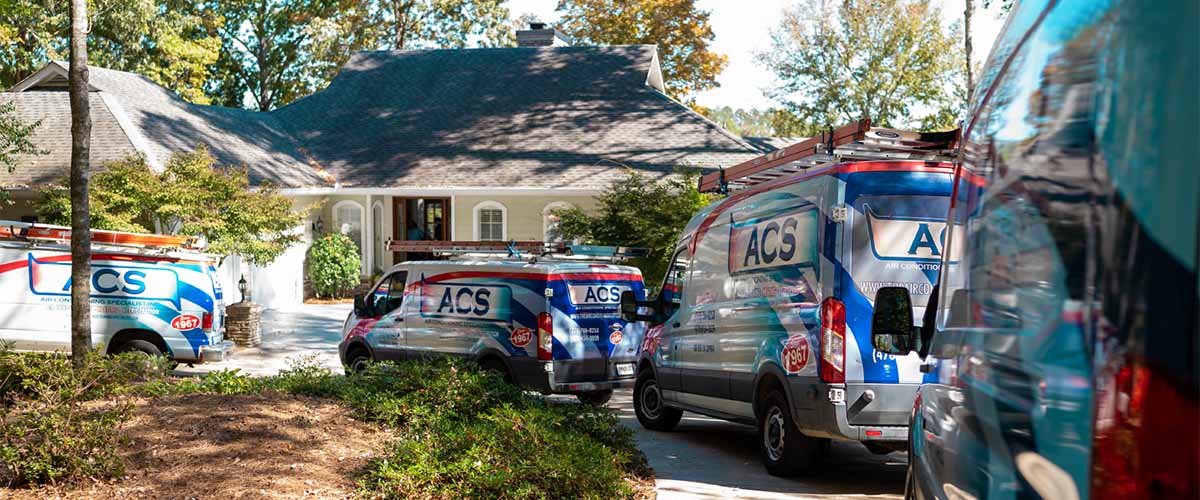MORE ABOUT THE AUTHOR: PAT HAYES
As CEO of the ACS Family, I’ve spent years observing what separates exceptional HVAC service from the merely adequate. Our team serves communities across Milledgeville, Covington, and throughout Georgia, where the combination of intense heat and high humidity creates unique challenges for both homeowners and service providers. Today, I want to share insights that will help you choose an air conditioning specialist who can truly meet your needs.
The decision to select an HVAC contractor affects your comfort, budget, and peace of mind for years to come. In Georgia’s climate, where we experience approximately 44 days annually above 90°F in the Atlanta area, your air conditioning system isn’t a luxury—it’s essential infrastructure. The high humidity that characterizes our region strains AC systems and increases workload, making the quality of your service provider even more critical. For comprehensive guidance on selecting the right specialist, explore our customer resources to make an informed decision.
Understanding Technical Expertise and Certifications
When evaluating an air conditioning specialist, technical expertise forms the foundation of quality service. As a Carrier Authorized Dealer, we understand the rigorous standards manufacturers set for their certified contractors. These certifications aren’t merely badges—they represent ongoing training, proven installation quality, and access to technical support that benefits our customers.
The HVAC industry faces significant technical transitions. The refrigerant transition from R-410A to R-454B by 2025 exemplifies the complexity modern contractors must navigate. We’re already experiencing R-454B shortages as of mid-2025, requiring specialists to maintain relationships with multiple suppliers and plan installations carefully. A qualified specialist should discuss these industry changes openly, explaining how they might affect your equipment choices and long-term service needs.
Beyond certifications, evaluate a contractor’s approach to ongoing education. Research suggests technicians who participate in regular training sessions demonstrate significantly higher problem-solving capabilities and customer satisfaction rates. Our technicians participate in regular training sessions, not because regulations require it, but because technology evolves rapidly. Heat pump efficiency improvements, smart thermostat integration, and diagnostic tool advancements all demand continuous learning. When interviewing potential specialists, ask about their training programs and how they stay current with industry developments.
Technical expertise also manifests in problem-solving abilities. Georgia’s coastal and city humidity accelerates corrosion, potentially reducing equipment lifespan by 20-30%. Experienced specialists recognize these regional challenges and recommend appropriate solutions, such as corrosion-resistant coatings or enhanced drainage systems. They should explain not just what they’re doing, but why specific approaches make sense for your situation. To discuss your specific needs with qualified professionals, schedule your consultation with our certified team.
What to Expect
Emergency response capability proves particularly crucial during peak season. We aim to respond within 2-4 hours for emergency calls during peak season, subject to technician availability. When evaluating specialists, inquire about their emergency protocols, staffing levels during summer months, and communication systems. A well-prepared contractor maintains sufficient staff to handle peak demand without compromising service quality.
Parts availability represents another critical infrastructure element. Our platform approach allows us to maintain broader inventory across multiple locations, reducing delays when specific components are needed. Recent findings from authoritative study indicate that contractors with robust parts networks complete 85% more repairs on the first visit compared to those relying solely on next-day delivery. Ask potential contractors about their parts sourcing, particularly for older equipment models. The ability to quickly obtain necessary components can mean the difference between a same-day repair and days without cooling.
Communication infrastructure deserves equal attention. Modern contractors should offer multiple contact methods, automated appointment reminders, and clear documentation of service performed. Our investment in customer communication tools reflects our belief that transparency builds trust. You should expect detailed invoices, comprehensible maintenance reports, and accessible service history records. If you’re ready to experience superior service standards, get started today with our comprehensive HVAC solutions.
Investment and Value
Preventive maintenance programs reveal a contractor’s commitment to long-term customer relationships. Our preventive maintenance members have seen emergency repair costs drop by around 40%, based on our internal service data. This statistic reflects the value of regular inspections, cleaning, and minor adjustments in preventing major failures.
Quality maintenance programs include comprehensive inspections, not just filter changes. Our technicians check refrigerant levels, test electrical connections, measure temperature differentials, and inspect drainage systems. Each component plays a crucial role in system efficiency and longevity. When comparing maintenance programs, examine the specific services included and their frequency.
The value proposition extends beyond cost savings. Regular maintenance visits allow technicians to identify developing issues before they cause failures. In our experience, homes with surge protection experience fewer electrical component failures—likely from reduced damage during storms. A thorough maintenance program should include recommendations for protective measures like surge suppressors, especially given Georgia’s frequent thunderstorms.
Consider how contractors structure their maintenance agreements. We offer flexible scheduling, priority emergency service, and repair discounts for members. However, we also maintain transparency about what maintenance can and can’t prevent. No program eliminates all repairs, but quality preventive care significantly reduces their frequency and severity. For detailed information about our maintenance programs and service options, contact our office to speak with a specialist.
Frequently Asked Questions
Q: How do I verify a contractor’s licenses and insurance?
A: Request license numbers and insurance certificates directly from the contractor. In Georgia, you can verify HVAC licenses through the state licensing board website. Adequate insurance should include both general liability and workers’ compensation coverage. We provide this documentation proactively, and any reputable contractor should do the same without hesitation.
Q: What questions should I ask during the initial consultation?
A: Focus on experience with your equipment brand, approach to diagnosing problems, and warranty terms. Ask about their service area boundaries, emergency response procedures, and pricing structure. Inquire about technician training and certification levels. We encourage detailed questions—they demonstrate an engaged customer who values quality service.
Q: How important are online reviews and ratings?
A: Online reviews provide valuable insights but require thoughtful interpretation. Look for patterns rather than individual complaints or praise. Pay attention to how contractors respond to negative reviews, as this reveals their commitment to customer satisfaction. We monitor our reviews carefully and address concerns promptly, viewing feedback as an opportunity for improvement.
Q: Should I always choose the lowest bid?
A: The lowest bid rarely represents the best value in HVAC services. Consider the scope of work, equipment quality, warranty terms, and contractor reputation. We’ve observed that customers who prioritize price alone often spend more on repairs and early replacements. Focus on value—the combination of fair pricing, quality work, and reliable service.
Q: What red flags should I watch for?
A: Be cautious of contractors who provide estimates without inspecting your system, pressure you for immediate decisions, or request large upfront payments. Avoid those who can’t provide proper licensing and insurance documentation. Legitimate contractors explain their recommendations clearly and allow time for consideration. Trust your instincts—if something feels wrong, it probably is.
Q: How do I know if I need repair or replacement?
A: This decision depends on equipment age, repair frequency, and efficiency concerns. We typically discuss replacement when repair costs exceed 50% of replacement value or when systems require frequent repairs. Energy efficiency improvements in new equipment can offset replacement costs through lower operating expenses. A trustworthy contractor presents both options objectively, helping you make an informed decision based on your specific circumstances.
Getting Started
Choosing an air conditioning specialist represents a significant decision for Georgia homeowners. The right contractor becomes a long-term partner in maintaining your comfort and protecting your investment. By evaluating technical expertise, service infrastructure, maintenance programs, and operational structure, you can identify specialists equipped to meet your needs. Our team at the ACS Platform Family remains committed to earning that trust through consistent quality service, transparent communication, and genuine care for our communities. The insights I’ve shared reflect our experience serving thousands of customers across Georgia, and I hope they help you make a confident, informed decision about your HVAC service provider.



